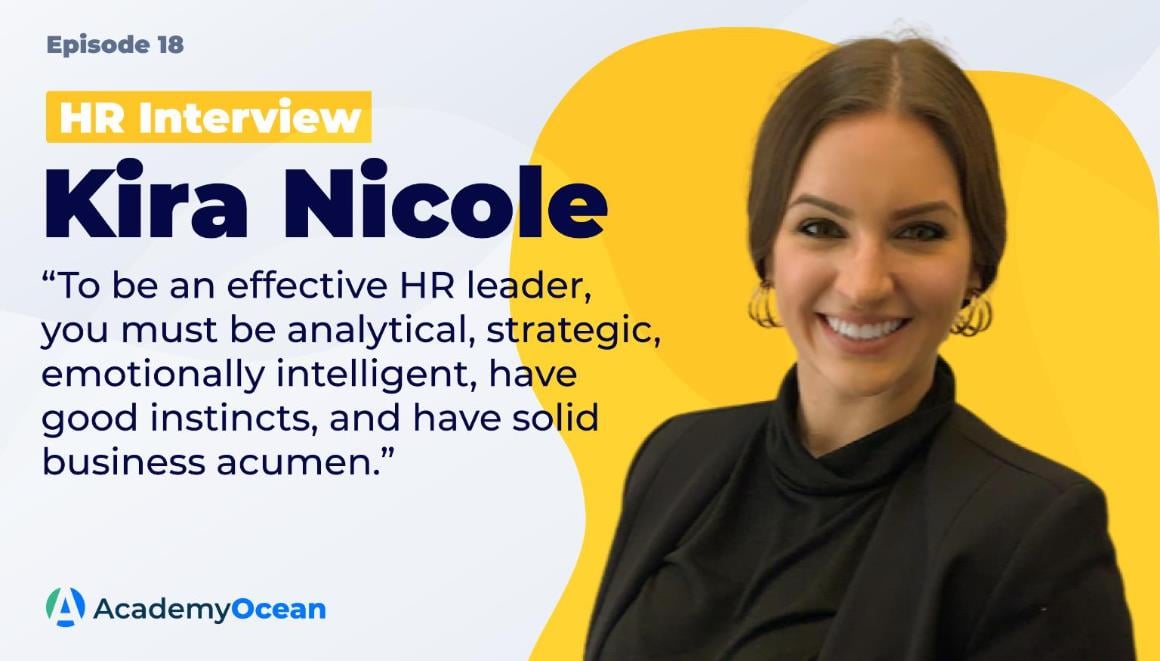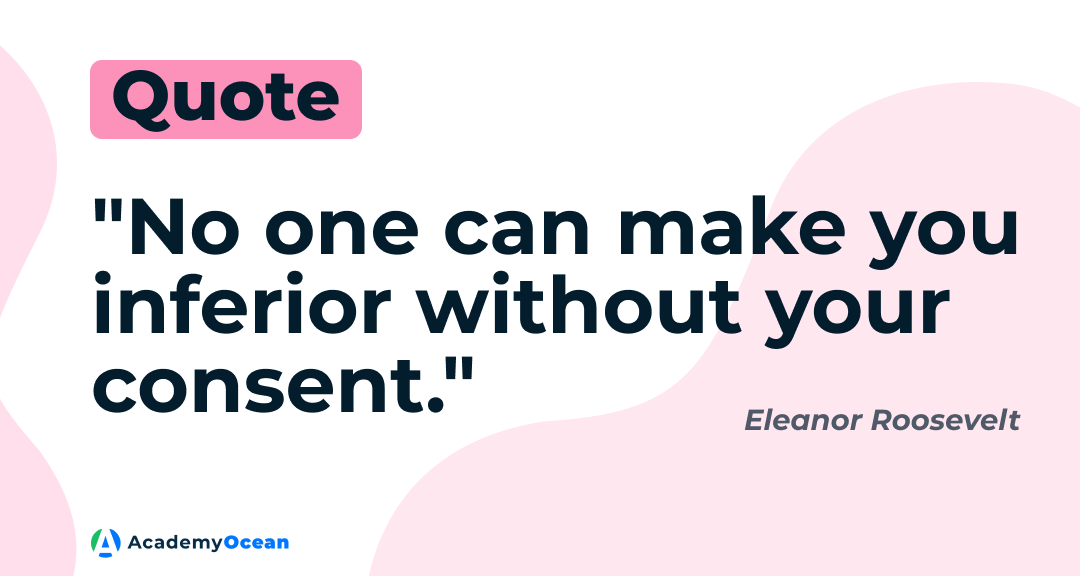Interview #18 Kira Nicole: "To be an effective HR leader, you must be analytical, strategic, emotionally intelligent, have good instincts, and have solid business acumen"

📌 Read the interview with Kira Nicole to find out why McDonald's was Kira's best working experience and a complaint of harassment she once received.
Good day, guys!
A new year is coming soon, everyone is summing up the results of this rather difficult year, and we continue to look for true HR experts from all over the world so that you learn as much as possible about the uniqueness of the HR sphere and about its deepest secrets.
Today our guest is a well-rounded Human Resources partner, Kira Nicole!

With a BBA in Human resources from Temple University and a Masters in Human Capital Management from LaSalle University, Kira is a well-rounded Human Resources partner, adopting the philosophy that good business is only achievable when it has good people enabled to be their best.
She started her career in Recruiting and has since worked in HR functional areas such as Operations, Project Management, Data Privacy and in a Generalist capacity. In her work as an HR Business Partner, she focuses on operational excellence, HR alignment with business needs, and ensuring every employee, leader, and the customer feels heard and important. As a manager, she takes pride in her ability to collaborate with her team to push the status quo, take risks, and rise to any challenge.
In her free time, she enjoys spending time with her husband and family, reading crime novels, and traveling (which she hopes to resume in 2021!).
AO: Hello Kira and welcome! Let's start our interview with the traditional question about starting your career as an HR professional.
Did you work somewhere before becoming an HR professional, why did you decide to become an HR?
K: I fell in love with the Human Resources field for a number of reasons, and none of them had to do with “loving people.” :-) When debating what I wanted to do in college, I grappled with Corporate Law, for its focus on perspective and interpretation. Hospitality, for its ability to create an experience, and Business Management, because up until going to college, I was a manager at McDonald's, which has been my favorite job to date believe it or not!
After taking a few HR classes and working as an intern, I realized the Human Resources field was exactly the right mix for me – compliance, compassion, culture, experience, leadership and strategy. I slowly started to understand that everything I loved at my job at Mcdonald's, making sure people were in the right positions, handling Employee relations, creating competitions to get SLAs met, etc. were all tied to Human Resources strategy.
For me, to be an effective HR leader, you must be analytical, strategic, emotionally intelligent, have good instincts, and have solid business acumen.
Because of the unique combination of skills, HR is one of the hardest roles to be successful in, and provides me with a new challenge every single day I go to work, which is why I love it!
AO: Can you share your thoughts on why HR is an important function in any organization?
K: This is a loaded question, but I am glad you asked it because too often people think of HR as the “Hire and Fire” team that policies policy. If done right, the HR function feeds every part of the company, from strategic planning to the company brand (especially when you think about the growing use of social media and sites like Glassdoor where employee insights are readily available for prospective employees and customers alike).
HR should not only enhance the employee experience but should strengthen business operations and provide a competitive edge.
Take, for example, my company. Most of the services provided by my organization are just that services and rely on talented individuals to deliver on our promises to our customers. In this example, HR is the department directly responsible for the quality of our product (aka our people). This holds true for most companies, where an organization’s ability to recruit, attract, and retain top tier talent is directly related to the innovation of products and services.
Just think about all of the diverse areas HR is accountable for throughout the organization.
- HR owns total rewards which cover how we pay, reward, incentivize and what benefits we offer (by the way, this is not just about attracting and retaining employees; labor costs, benefits costs, rewards programs, all impact the bottom line and require financial strategy).
- HR minimizes liability, drives training and development, leads diversity and inclusion and focuses on the engagement of its workforce.
These all in their own respects have been directly linked to increased productivity and innovation. So, in its simplest form, HR is important because strategically managing human capital has direct effects on organizational success.
AO: Good point. We usually ask HR experts about the future of this area and we always get completely different ideas about what will change.
Share with us where do you see the HR industry in the next 5 years?
K: The Human Resources industry will always be in a constant state of change because the function is so closely tied to the economy, industry, legislation and the workforce. We have probably seen a great example of this during 2020 as companies turn to HR for policy, strategy and direction after COVID-19.
I think some areas of HR will strengthen, for example as younger generations enter the workforce they will be more informed of employee rights, and new legislation will continue to be passed to protect employees and their privacy, solidifying the role HR plays in compliance and risk mitigation.
I believe we will continue to see a digital evolution in HR as technology becomes more advanced and ‘consumer-like’ experiences in the workplace become expectations from employees.
For example, I anticipate administrative tasks such as payroll, benefits administration, or tier one employee inquiries being automated, and available via self-service models or HR chat-bots 24/7.
Overall, I see HR becoming more strategic in nature, focusing on psychology, analytics and future trend predictions. IT and HR will become more intertwined, with roles like HR Data Analysts, HR Business Continuity Specialists, and HR Bias Auditors becoming more popular. I also think HR will have to use psychology to create a more holistic approach to the employee experience and have an increased focus on brand management through employee experience.

AO: Kira, all types of industries, without exception, have challenges. What difficulties do you usually face working as an HR specialist?
K: HR is an ever-changing function, so there are challenges every day associated with balancing the administrative aspects of the role and bringing strategic value to the table.
More recently, I think there have been legislative and compliance difficulties with ensuring local law and needs are met for larger companies. Just think about COVID and each city’s different approach to closures, supplemental time off, etc. Even still, I think the most difficult part of working in HR is the same part that makes the role challenging and fun, which is that no one company, person, situation, or initiative is the same.
Sure, there are best practices in the industry, but the reality is that everything you do as an HR professional needs to be tailored to the person, leader, industry, or company culture you support. Every day is different, every day is a challenge, and I wouldn’t have it any other way!
AO: Of course, there is something you would love to change. Can you name three areas that you feel need the most improvement, based on your understanding of common HR practices?
K: You can probably predict based on my previous answers that I think HR can and should continue to invest in digital transformation. Specifically around administration and tier 0 and tier 1 level support.
Another area, which I mentioned earlier as well, is in the area of predictive analytics and data-driven decision making. HR practitioners can better leverage the data available to them to start planning proactively in relation to topics such as workforce trends, retention needs, success rates in roles, development programs, etc.
My third area would be on soft skill leadership development. One of the many things that have come out of 2020 has been a highlight on the empathy, communication, emotional intelligence and political navigation skills required of leaders today. Soft Skill development is difficult, and our leaders are being called upon more and more each day to have difficult conversations about difficult topics, and manage their teams through some of the most challenging and uncertain times in our country. Soft skill development takes consistency, dedication and resource allocation to ensure investments have the anticipated return, and I think this is an area HR should continue to research and refine.
What improvements need the HR sphere in 2021? Ask our experts!
AO: You are so enthusiastic about answering the questions and I think your attitude towards HR was influenced by someone or perhaps you were inspired.
Can you name one (or several) HR experts whose work do you highly appreciate or take as an example?
K: There is so much great work being done in the field of HR and Leadership. My personal feeds tend to gravitate more toward the Psychology of the workforce, following the work of leaders like Adam Grant, Amy Edmonson, and Brene Brown. But, I wouldn’t be doing this question justice if I didn’t acknowledge my respect for the work of Stefan Ries, former SAP CHRO, and Philly’s own Jameel Rush, Aramark Leader of Diversity & Inclusion.
AO: While developing a product for employee onboarding and training, we have to ask the following question.
How does the onboarding of new employees go into your company?
K: Onboarding in any company is extremely important, my organization is no different.
Onboarding is the employee’s introduction to the company, the culture, and the people. It sets the tone for an employee's integration efforts and can impact the time to productivity and overall employee experience.
My company has invested heavily in this process, creating a program focused on cultural integration, continuous touch-points, and resource availability. We have amazing leaders who have worked hard to ensure managers, team members, HR partners, and leaders are all engaged in the onboarding process.
I would make the point, though, that onboarding, like most HR initiatives, will evolve in the coming years. While retention and cultural integration is the primary goal today, I think time-to-productivity and functional training will be a bigger focus in the coming years.
I think this will happen in reaction to the competitive talent landscape, and the average time worked at a company continuing to drop. We will be onboarding more people, more quickly, for an overall shorter tenure.
AO: Nice and what about corporate culture? What traditions your company has and what is your favorite one?
K: My organization is one rooted in rich history, experience and tradition. Our leaders pride themselves on building a culture that is inclusive, challenging and invests in its people both professionally and personally. Their initiatives and annual traditions reflect this. While there are so many inspiring traditions throughout our company, my most fond memories are in the more simple traditions of spending time with one another. For example, our HR leader will host annual events like Crock-toberfest (potluck) or Smoothie days, just to be with one another and have fun!
AO: Wow, Smoothie day, so extraordinary and tasty 😋
Kira, what is the most valuable professional development advice you have ever gotten?
K: This is a two-parter for me. One of my mentors told me once not to let others manage my career. The context of this stemmed from the idea that success is not something that is given to you by someone else or laid out by your boss or company. You have to navigate your own career and make decisions about what skills and talents you want to develop to prepare yourself for your future.
I have had leaders tell me that I “do not have focus and need to pick a specialty” or tell me that a decision I have made may not “suit my career projection,” but the reality is that every career move I’ve made, whether it be spending time working in operations, in Project Management, in Data Privacy, etc. were all made because these are skills I believe will position me to be a better partner, a better leader, and provide maximum value in the future.
Having the confidence of knowing I need to curate my own path has helped me through times when others doubted some of my decisions.
The second, and perhaps most valuable piece of advice I’ve ever received, came from a woman who is not only a successful business leader but is also my mom :-). She frequently references Eleanor Roosevelt’s quote, “No one can make you inferior without your consent.” While this has proven helpful throughout every aspect of my life, in a business context it has helped me manage through imposter syndrome and ensure I made no decision rooted in fear.

AO: Your assertiveness and movement towards your goals deserve respect. It is really awesome.
And now a bit of allegorical question. If the company you work on now were a person, what kind of person would it be?
K: This is a tough one as each of our subsidiaries have their own unique personality. We are more like a family of characters as opposed to a single person. But, if I were to describe the head of the household, it would be someone who is accomplished, hard-working, wise, ethical, and who views every challenge as an opportunity. This person, though, would be a little corky, not afraid to be unconventional in their approach to obstacles!
AO: Kira, let's now look a little into the future. What types of tools do you think every HR should be using in 2021?
K: Every HR organization should be using self-service functionality. This type of tool should extend far beyond Employee record maintenance, but also integrated into programs and processes like performance management, communication, and training.
With remote work becoming the norm for professional workers, having the flexibility to access and absorb information quickly and 24/7 is important.
HR should also be using Data dashboards, and analytics software to make informed talent decisions and predictions. Tracking software and technical solutions to local compliance maintenance is probably also a good idea, allowing HR to have a pulse on the workforce with limited resources.

AO: And what HR trends do you think will emerge in 2021?
K: I anticipate there will be an increased focus on some of the trends already put in motion in prior years, following our 2020 experience.
How we work: I believe companies will maintain some of the remote working options post-covid, and technology will continue to be a primary source of communication. I also think when companies begin to recover from the economic impact of COVID, we will see an increase in once full-time roles, being replaced with consultants, contractors, or temporary resources. This will allow for a more flexible workforce that can effectively respond to future business needs and take swift action in response to economic, legislative, or industry change.
How we hire: Companies are focusing on doing more with less as they rebuild, so recruiting will need to become innovative in how they balance potential, experience, and functional knowledge as they evaluate candidates. Roles will be condensed and re-scoped, requiring a unique combination of skills and functional knowledge that may be hard to come by.
Diversity & Inclusion: Following the election and the civil unrest in 2020, I think companies will have to invest time and resources in 2021 about how we talk about and support diversity and inclusion. For example, I think we will see organizations striving to promote psychological safety and being comfortable with the uncomfortable. I anticipate formal training will be replaced with panel conversations and open forums.
AO: Thanks a lot, Kira for such a detailed explanation.
Let's close our interview with an entertaining question. What was the funniest/most unusual incident during your HR practice?
K: I think every HR person has had the thought that one day they could write a book describing their experiences in the field. I am no different, having the occasional investigation into who was taking who’s lunch, who was sneezing too loud, and who was dating who. I think one of my funniest cases was when I received a complaint of harassment accusing an employee of intentionally “stinking up the bathroom” in an effort to force another employee to endure the smell. As you can imagine, that investigation took some interesting turns :-)
AO: Hahah, I can really imagine what interesting turns the investigation took 😬😅
Thanks a lot, Kira for such a brilliant interview. We wish you all the best in your career in the next year. Stay safe!
That's all for today, friends. See you at the next interview!
In case you would like to ask your own questions, write them down in the comments. Also, if you want to read an interview with a particular person, let us know.
Learn more about LMS 2.0 Platform for employee training.
Take care 😇